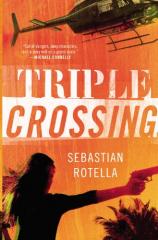Triple Crossing
Review
Triple Crossing
TRIPLE CROSSING, investigative reporter Sebastian Rotella’s debut novel, is a tough one to describe. Brilliant in places, slow in others, it ultimately succeeds as an attempt to harness a description within its four-cornered boundaries of the chaotic situation --- cultural, practical and political --- that exists at the southern border of the United States, and the effects and consequences of the same throughout the world. It’s a tall order, maybe too tall, and the fact that Rotella succeeds at all makes the somewhat uneven ride through the pages of the tale ultimately worth it.
"Rotella’s enigmatic but very believable guide through the book is a U.S. Border Patrol agent with the wonderful name of Valentine Pescatore."
Rotella’s enigmatic but very believable guide through the book is a U.S. Border Patrol agent with the wonderful name of Valentine Pescatore. The type of person who does his job well, even as he is not without sympathy for his charges, Pescatore is not above arresting illegal aliens with one hand and quietly slipping them a few bucks with the other, even as he sends them packing to the southern side of the border. Pescatore’s dogged desire to do the job aggressively attracts the attention of his supervisor, Arleigh Garrison, who feels that Pescatore might be ready to step up to another level. Garrison, a badly bent supervisory agent, is not above mistreating prisoners and occasionally smuggling the bad goods into Mexico.
Pescatore, caught between a rock and a hard place, ingratiates himself with Garrison at the request of Isabel Puente, an agent with the U.S. Inspector General’s Office. Puente wants Pescatore to hopefully trace Garrison back up the line to a powerful Mexican crime syndicate headed up by a sadistic but popular gangster named Junior Ruiz Caballero with the tacit support of Junior’s uncle, a Mexican senator. Leonardo Mendez, the head of a special Mexican law enforcement unit known as the Diogenes Group and famous for fighting political and criminal corruption, is determined to bring Junior down at all costs, and Puente hopes that her efforts, and the utilization of Pescatore, will enable him to do this. Pescatore manages to insert himself into Garrison’s extracurricular activities (and to do the same with Puente as well, in a manner of speaking); a disastrous incident, however, puts Pescatore on the run, wrongly accused of the murder of a police officer.
With nowhere else to go, Pescatore delivers himself to Junior, which is precisely where Puente had hoped he would go. But at what cost? His loyalty questioned by both the police and the criminals with whom he has thrown in, and wanted by dogged law enforcement officials in two countries, Pescatore is in a very dangerous place, one where he himself is not entirely sure which way he should go, if he is to come out alive. In a nightmarish denouement in the Triple Border area of South America, Pescatore is put in a position where any decision he makes can be fatal, not only for himself, but for those he cares about the most.
There is some rough slogging through spots in TRIPLE CROSSING. The dialogue is one point of contention. At times, Rotella writes conversations like the heir apparent to Elmore Leonard; at others, it borders on the tedious. Some of the vignettes, particularly near the end of the book, are brilliant (there is a scene in a shopping mall that you’ll never forget), while others are somewhat mishandled. Still, Rotella demonstrates flashes of brilliance here and there. His description of a Mexican prison is jaw-dropping, and a particularly ironic situation that Pescatore walks into on his way to the book’s climax is worth the price of admission all by itself. As for the ending, the last few sentences were enough to make me put Rotella on my must-read list for his future efforts.
TRIPLE CROSSING is not always easy reading, but at story’s end it is more than worth it, and carries the promise of even greater things from Rotella.
Reviewed by Joe Hartlaub on September 8, 2011





